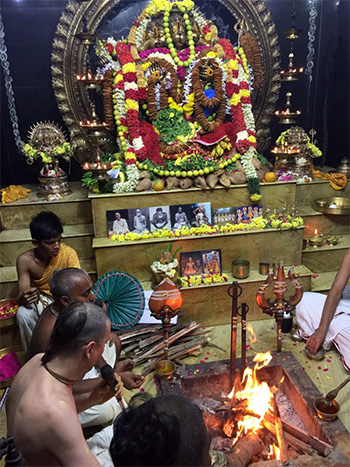Question: Can devotion to God (bhakti) be acquired by all?
There is an interesting story in the Puranas that tells of a previous life of Bhakta Prahlada. Everyone knows that Bhakta Prahlada is a great devotee of the Lord. He is one of the twelve mahajanas, or great authorities on devotional service (bhakti-yoga) as mentioned in Srimad Bhagavatam. But there is a history as to how he developed love of God, for he wasn’t always of that nature.
In summary, the Puranas tell us there once was a man who was attached to sinful activities. He was especially fond of a particular lady whom he lived with. Due to his great anger, he would always be fighting and arguing with this lady. One day he started fighting from the first moment he woke up, before the sunrise. They argued back and forth, yelling and throwing things at each other. Their anger was so great that they continued arguing non-stop until the next morning, not even taking a break to eat. By chance that day had been Nrisimha Chaturdashi (the appearance day of Sri Nrisimha Avatara). Since this man did not eat that day, it was considered that he had performed the austerity of fasting on the appearance of Sri Nrisimha. By this ajnata-sukriti he began his service to the Lord, and eventually he became the great devotee Bhakta Prahlada.
The Purana does not mention how many lives occured between this one and the birth of Prahlada, nor what other processes of service to the Lord he later performed. But it shows us the power of devotional service. Even by unknowingly engaging in service one begins his journey towards liberation. Even if we do not perform the activity as a service, the Lord is so mercifully that He looks for an excuse to bless us.
Similar to this, we find many stories in the scriptures which show us the process of cultivating or developing devotion. Mrigari the hunter was the most evil person, yet Narada instructed him to chant the name of Rama. Being unable to appreciate the name of Rama, Mrigari was not able to chant. Seeing this, Narada told him to instead chant the word “mara” which means “death”. Mrigari was expert at killing animals, and he would especially enjoy to half kill animals and watch them suffer. We can imagine such a cruel person. So when Narada told him to chant “death” (mara), Mrigari found it very easy and natural.
Mrigari sat and chanted over and over again this word – mara, mara, mara. As he chanted over and over again, the gap between the words disappeared and instead of chanting “mara”, he was chanting “rama”. The name of Sri Rama is so powerful that it developed love of God even in the heart of the cruel hunter Mrigari. Mrigari did not know he was chanting the name of Lord Rama, but even accidentally if one chants, it purifies one’s heart. This same Mrigari, by chanting again and again this name of Sri Rama, transformed into the sage Valmiki. Valmiki, the great saint glorified by all, was originally the most cruel hunter who had no trace of love for God. The cultivation of devotion by chanting the name of Rama was so effective that Valmiki was entrusted with the service of composing the great epic Ramayana.
It is not amazing that, by chanting, such personalities have become purified and attained perfection. The names of Lord Krishna are not material sound. On the level of spiritual sound there is no difference between the name and the object. By chanting the Lord’s sacred name we can associate directly with the Lord. Such purifying association definitely helps us develop love of God, even if performed unknowingly.
The Srimad Bhagavatam confirms this as follows:
shrinvatam sva-kathah krishnah
punya-shravana-kirtanah
hridy antah stho hy abhadrani
vidhunoti suhrit satam
“Sri Krishna, who is the Paramatma in everyone’s heart and the benefactor of the truthful devotee, cleanses the desire for material enjoyment from the heart of one who has developed the urge to hear His messages, which are in themselves virtuous when properly heard and chanted.”
By engaging in shravanam (hearing) and kirtanam (chanting) about Lord Krishna, one’s heart is purified. The word used in this verse is “abhadra”, or that which is not auspicious within one’s heart. This refers to lust, anger, greed, envy, etc. By chanting the Lord’s names, and by hearing of His divine activities, one becomes purified of these bad qualities. This is the gradual process of cultivating love for God.
Receive our daily email newsletter on Hinduism, Yoga, Meditation, Ayurveda and Natural Healing.






